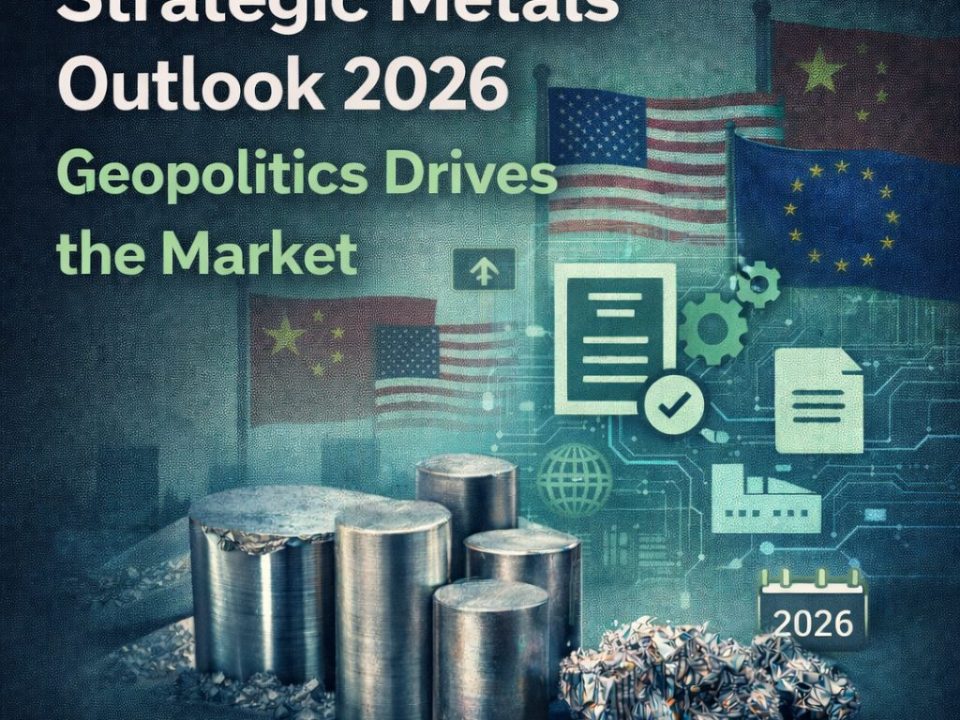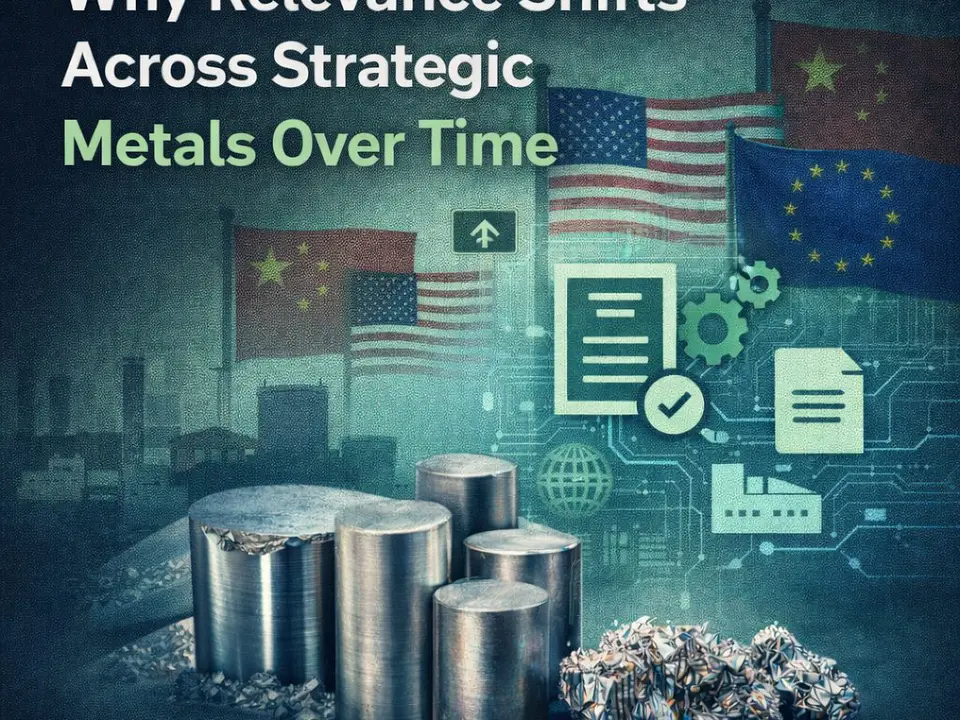
Weekly News Review April 14 – 20 2025
April 20, 2025
Visitor Tour Recap: Inside Tradium’s Expanded Frankfurt HQ & Vaults
April 29, 2025Welcome to our weekly news review.
China released its second batch of March export data this week, revealing a sharp drop in gallium and germanium shipments to historic lows. At the same time, the U.S. advanced efforts to diversify its critical mineral supply chains. All the news is here in our weekly round-up.
USA: MP MATERIALS SUSPENDS RARE EARTHS SALES TO CHINA AMID TARIFF WOES:
MP Materials, the operator of the only rare earth mine in the United States, has suspended exports of rare earth raw materials to China due to sharply increased tariffs. “Selling our valuable critical materials under 125% tariffs is neither commercially rational nor aligned with America’s national interest,” the company said late last week. As a response to trade tariffs imposed by U.S. President Donald Trump, under which China faces the highest rate currently, the People’s Republic retaliated with tariffs of its own. U.S. companies now face a 125% levy to export goods to China.
A substantial share of MP’s historical revenue came from selling rare earth concentrate to its fourth-largest shareholder, China’s Shenghe Resources, which further processes the material. Despite the halt, Shenghe Resources issued a press release on Sunday (PDF) affirming its contract with MP remains valid. The company also emphasized that it has built a diversified supply chain—including domestic sources and international imports—to minimize any disruption resulting from MP’s decision. Shenghe added that it closely monitors the situation and will continue to meet operational demands.
MP Materials, meanwhile, highlighted that its California refinery now processes nearly half of its production, with refined products primarily sold in markets outside China. The company stated it will maintain operations at its Mountain Pass mine and stockpile concentrate while accelerating the development of its midstream and downstream processing capabilities. It also highlighted efforts to future heavy rare earth processing and magnet manufacturing in its Texas facility. China has a near-monopoly on heavy rare earth production and magnet making, accounting for over 90% and 95% of the global capacity, respectively.
CHINA: GALLIUM AND GERMANIUM EXPORTS PLUMMET IN MARCH:
According to newly released customs data, Chinese exports of the minor metals gallium and germanium fell sharply in March, hitting historic lows. Only 300 kilograms of gallium were shipped during the month—all bound for Germany—while 1,497 kilograms of germanium were exported, with two-thirds destined for Russia. Belgium received most of the remaining volume, with only minor shipments going to other countries.
The latest figures represent a drop of over 75% for gallium and more than 50% for germanium compared to March 2024, when China exported 1,214 kilograms of gallium and 3,206 kilograms of germanium.
China is the world’s leading producer of metals essential to various high-tech applications, from semiconductors and photovoltaics to fiber optics and defense systems. In the summer of 2023, Beijing imposed export controls on these strategic materials. In December 2024, the Chinese government banned exports to the United States, escalating an ongoing trade conflict.
UNITED STATES FAST TRACKS “FIRST WAVE” OF STRATEGIC METALS PROJECTS:
The U.S. government has announced the “first wave” of critical mineral projects selected for expedited permitting as part of a broader strategy to bolster the nation’s domestic resource sector.
The ten projects—spanning copper, lithium, gold, silver, potash, and coal—include developments led by major players such as Rio Tinto, Albemarle, and Perpetua Resources. The projects have been added to the federal permitting dashboard under the FAST-41 program, an initiative launched in 2015 to accelerate approvals for critical infrastructure. The program enhances transparency and streamlines the federal environmental review process.
The first mining project to receive FAST-41 treatment was South32’s Hermosa zinc-manganese project in Arizona, which President Joe Biden fast-tracked in February 2024.
Last week, President Donald Trump ordered an investigation into the country’s imports of critical minerals (we reported). The probe aims to assess supply chain vulnerabilities, evaluate domestic downstream industrial capacities, and recommend potential countermeasures. Fast-tracking domestic production capacities could also be a move towards becoming more independent from industry leader China.
SOUTH KOREAN FIRMS TOLD TO STOP SUPPLYING RARE EARTHS TO US DEFENCE INDUSTRY:
China has recently introduced new export regulations for certain rare earth elements classified as dual-use goods—materials that can serve both civilian and military purposes. While the rules do not target specific countries by name, several U.S. companies have been added to a Chinese list of foreign entities barred from access to dual-use products. According to Reuters, these include defense contractors and firms allegedly maintaining close ties to Taiwan.
In what appears to be a tightening of enforcement, Beijing is now refining its export controls, potentially making it more challenging to reroute shipments through third countries. A similar move occurred in December 2024, when China took steps to restrict exports of gallium and germanium.
According to The Korea Economic Daily, several South Korean industrial firms have received a notice from China’s Ministry of Commerce urging them to cease exports of rare-earth-based products to U.S. defense companies. The letter reportedly warns of possible sanctions for noncompliance, though the nature of these penalties remains unclear. The development has sparked concern in South Korea about being drawn deeper into the escalating geopolitical and trade tensions between the United States and China.
UNITED STATES: BOOST FOR RARE EARTH RECYCLING –
Cyclic Materials is set to launch operations in Arizona next year.
Cyclic Materials is investing $20 million in its first commercial rare earth recycling facility in the United States. According to the Canadian company, the plant, scheduled to begin operations in early 2026, will use proprietary technology to recover rare earth elements from permanent magnets found in discarded electronics. This recovered material will be a critical resource for wind energy and electric mobility industries.
The facility in Mesa, Arizona, is expected to create over 30 new jobs. Industry giants, including Microsoft, BMW iVentures, Hitachi Ventures, and Amazon, have already backed the startup. Strategic partnerships are also in place with companies like Solvay and Vacuumschmelze, which plan to offtake the recycled materials. In addition to its U.S. operations, Cyclic Materials aims to expand its innovative recycling process into Europe.
AUSTRALIA REVEALS MORE DETAILS ON STRATEGIC METALS RESERVE:
On May 3, Australians head to the polls to elect a new parliament, a vote that will also determine whether Prime Minister Anthony Albanese remains in office. In anticipation of a potential second term, Albanese announced plans to establish a government-backed strategic reserve for critical minerals earlier this month.
On Thursday, Albanese unveiled the first concrete details of the initiative. The reserve will be built on two key pillars. First, through “National Offtake Agreements,” the government will secure access to critical minerals from private sector projects via long-term contracts or purchase options. Second, the state will begin stockpiling specific minerals, creating a national reserve sourced directly from these agreements.
The official statement did not specify which minerals would be included, mentioning only rare earth elements. Notably, Australia is home to Lynas, one of the few non-Chinese companies that handles the extraction and, in the future, the processing of rare earths.
Beyond bolstering the security of supply for key industries and enhancing national resilience, the reserve is also expected to deliver financial benefits. Revenue will be generated through global sales and partnerships with international buyers. The plan is also designed to provide greater certainty for the mining sector and encourage fresh investment, with the state acting as a stabilizing force. Initial investments in the strategic reserve are projected at around $760 million, with operations potentially beginning in the second half of 2026.
UNITED STATES FUNDING BOOST FOR STRATEGIC METALS FROM AUSTRALIA:
Amid growing concerns over China’s tightening grip on critical mineral exports, the U.S. government has pledged up to $190 million in potential funding for Australian mining company Victory Metals’ North Stanmore rare earth project in Western Australia. The company aims to extract key critical minerals from the North Stanmore deposit, including rare earth elements such as terbium, dysprosium, and scandium, along with the technology metal hafnium.
To support the project’s development, the U.S. Export-Import Bank (EXIM) has issued a non-binding letter of interest for a loan worth up to $190 million. According to a statement, additional funding through EXIM remains a possibility. The financing is being made available under the China and Transformational Exports Program, an initiative to support U.S. exporters facing global competition from state-backed Chinese enterprises.
Victory CEO Brendan Clark called the announcement a significant milestone for the company and a clear signal of North Stanmore’s strategic value as a stable, non-Chinese source of critical minerals.
The company describes the site as Australia’s largest deposit of heavy rare earths like terbium and dysprosium, vital to various advanced technologies. These resources are extracted almost exclusively in Myanmar and China, with all refining taking place in China. Just weeks ago, Beijing tightened export restrictions on nearly all heavy rare earth elements amid ongoing trade tensions with the U.S., raising concerns about global supply chain vulnerabilities.
UNITED STATES: NEW EXECUTIVE ORDER AIMS TO BOOST US ACCESS TO DEEP SEA MINERALS –
President Donald Trump signed an executive order on Thursday to jumpstart the U.S. offshore critical minerals industry to bolster the nation’s access to key resources by strengthening domestic capabilities for deep-sea exploration, mineral collection, and processing. It calls for streamlined permitting to fast-track seabed projects while maintaining environmental and transparency standards. The order also directs greater investment in mapping the ocean floor and advancing technologies to support seabed mineral extraction.
The deep sea contains a variety of mineral-rich deposits, including polymetallic nodules—rocky formations loaded with nickel, copper, manganese, and rare earth elements. The order also includes other valuable materials like cobalt-rich crusts, sulfides, and heavy mineral sands, which are called “seabed mineral resources,” encompassing a wide array of raw materials.
Mineral Processing Incorporated Into the Order:
The order arrived just weeks after the Trump administration floated the idea of ramping up deep-sea mining efforts (we reported). However, some experts warned that exploration alone would fall short without the ability to process the extracted minerals. This latest order addresses those concerns by incorporating mineral processing and refining into the strategy.
Beyond U.S. waters, the order also calls for a report on private sector interest and opportunities for seabed exploration and mining in international waters and in the jurisdictions of allied nations seeking to collaborate with the U.S. on these efforts.
Deep-sea mining remains a highly controversial topic. Multiple countries, including Germany, advocate for a moratorium on this resource extraction until its impacts on marine ecosystems are better studied. Meanwhile, others, including the U.S. and China, are pushing ahead with new initiatives.
Figure of the Week: 92.5% of total power capacity expansion in 2024 came from renewables, with solar accounting for the lion’s share.
If you want to learn more about the benefits of owning strategic metals as physical assets, please contact us to schedule a free, no-obligation introduction call.






